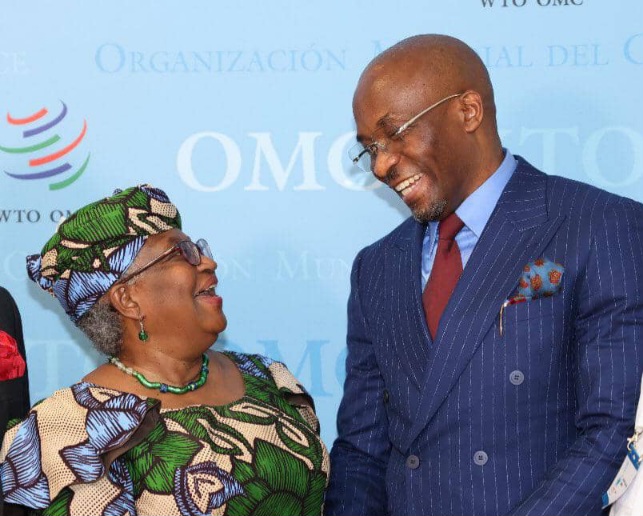Deputy Speaker of the House of Representatives, Hon. Benjamin Kalu, has solicited the cooperative efforts of the World Trade Organization (WTO) in boosting the exportation of primary products from Nigeria and Africa in general.
Hon. Kalu gave the charge on Monday when he visited the WTO Director-General, Dr. Ngozi Okonjo-Iweala in Geneva on the sidelines of the ongoing 148th assembly of the Inter-Parliamentary Union (IPU) in Switzerland.
The Deputy Speaker who accompanied the Senate President and leader of the Nigerian delegation, Senator Godswill Akpabio, to the IPU Assembly, to the headquarters of WTO raised concerns about a downward slope of export of primary products from Africa to other parts of the world.
He said that most businessmen from the shore of Africa encountered challenges marketing the products due to aflatoxins that come in contact with them before reaching their destinations, especially within the framework of ‘The African Growth and Opportunity Act (AGOA)’ which ultimately provides duty-free treatment to goods of designated sub-Saharan African countries (SSAs).
Available report describes aflatoxins as various poisonous carcinogens and mutagens that are produced by certain molds, particularly Aspergillus species.
ALSO READ: World Bank, L-PRES hail Makinde’s commitment to livestock production
The fungi grow in soil, decaying vegetation and various staple foodstuffs and commodities such as hay, sweetcorn, wheat, millet, sorghum, cassava, rice, chili peppers, cottonseed, peanuts, tree nuts, sesame seeds, sunflower seeds, and various spices.
Hon. Kalu therefore solicited the help of the WTO to set up centres in Africa for the treatments of the primary products packaged for export.
“Africa is interested in exporting our primary products. We have always had issues with these primary products we are exporting. Aflatoxins, I don’t know what you are putting together to help these products reduce that because it’s one of the complaints about products coming from Africa.
“I don’t know if there will be centres around Africa where businessmen who cannot afford to do this decontamination will get to that particular centre and detoxify their products to be able to meet the quality specifications before selling them off. Is the WTO interested in this and how much so? Are there programmes designed to be able to facilitate this?” Hon. Kalu enquired.
Responding to the Deputy Speaker’s enquiries, WTO Director-General, Dr. Okonjo-Iweala said that WTO is aware of development and is also eager to assist countries implement their respective protocols on the issue.
“At the WTO, we have been heavily promoting something we called re-globalization. We are trying to persuade supply chains of companies located outside Africa, we are trying to tell them that a good place. The WTO is very much aware. Many of the rules are built based on our rules.
“So, we have an interest in keeping in touch and making sure any country that wants to request our help to implement their protocols and so on will be able to do that. And we hope it will take off in a good way.
“Now, one big thing we have to watch is, we cannot all trade the same thing to each other. We are growing primary products. We are not going to trade Cocoa to Cote D’Ivoire. We can trade oil because most of them want oil but we don’t just want to trade that,” she noted.
